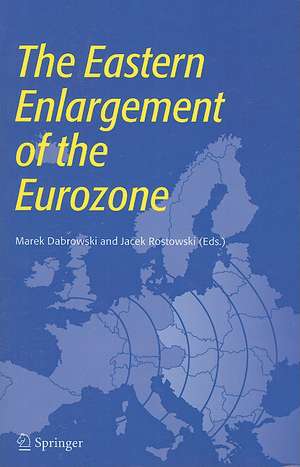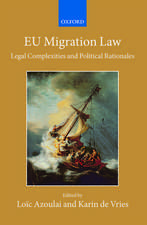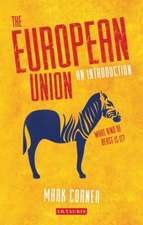The Eastern Enlargement of the Eurozone
Editat de Marek Dabrowski, Jacek Rostowskien Limba Engleză Paperback – 29 oct 2010
| Toate formatele și edițiile | Preț | Express |
|---|---|---|
| Paperback (1) | 638.89 lei 6-8 săpt. | |
| Springer Us – 29 oct 2010 | 638.89 lei 6-8 săpt. | |
| Hardback (1) | 644.49 lei 6-8 săpt. | |
| Springer Us – 11 ian 2006 | 644.49 lei 6-8 săpt. |
Preț: 638.89 lei
Preț vechi: 751.64 lei
-15% Nou
Puncte Express: 958
Preț estimativ în valută:
122.29€ • 132.88$ • 102.79£
122.29€ • 132.88$ • 102.79£
Carte tipărită la comandă
Livrare economică 22 aprilie-06 mai
Preluare comenzi: 021 569.72.76
Specificații
ISBN-13: 9781441938343
ISBN-10: 1441938346
Pagini: 248
Ilustrații: XVI, 232 p.
Dimensiuni: 160 x 240 x 13 mm
Greutate: 0.38 kg
Ediția:Softcover reprint of hardcover 1st ed. 2006
Editura: Springer Us
Colecția Springer
Locul publicării:New York, NY, United States
ISBN-10: 1441938346
Pagini: 248
Ilustrații: XVI, 232 p.
Dimensiuni: 160 x 240 x 13 mm
Greutate: 0.38 kg
Ediția:Softcover reprint of hardcover 1st ed. 2006
Editura: Springer Us
Colecția Springer
Locul publicării:New York, NY, United States
Public țintă
ResearchCuprins
When Should the New Member States Join EMU?.- The Exchange Rate: Shock Generator or Shock Absorber?.- Do the New Member States Fit the Optimum-Currency-Area Criteria?.- EMU Enlargement and Trade Creation.- Future EMU Membership and Wage Flexibility.- Exchange Rate Regimes and Nominal Convergence.- EMU Enlargement and the Choice of Euro Conversion Rates.- The Short-Run Macroeconomic Effects of Discretionary Fiscal Policy Changes.- How to Reform the Stability and Growth Pact.- Uneven Growth in a Monetary Union.- ECB Decision-Making in an Enlarged EMU.- A Strategy for EMU Enlargement.
Notă biografică
Marek Dabrowski is Professor of Economics, Chairman of the CASE Foundation Council, Chairman of the Supervisory Board of CASE-Ukraine in Kiev, former First Deputy Minister of Finance of Poland (1989-1990) and former Member of the Monetary Policy Council of the National Bank of Poland (1998-2004). In the last decade he has been involved in policy advice and policy research in Belarus, Bosnia and Herzegovina, Bulgaria, Georgia, Iraq, Kazakhstan, Kyrgyzstan, Macedonia, Moldova, Mongolia, Romania, Russia, Serbia, Ukraine and Uzbekistan and in a number of international research projects related to monetary and fiscal policies, currency crises, EU and EMU enlargement, and the political economy of transition.
Jacek Rostowski is Professor of Economics at the Central European University, Budapest, Adviser to the CEO of Bank Pekao, Warsaw, a Member of the CASE Foundation Council, Senior Fellow at CASE, and an Associate of the International Economics Program at the Royal Institute of International Affairs, London. During 1997-2001 he was Chairman of the Macroeconomic Policy Council at the Polish Ministry of Finance and during 2002-4 he was Adviser to the Governor of the National Bank of Poland. He has also advised on the transition from communism in Belarus, Latvia, Russia, Serbia and Ukraine. He has published widely on monetary and financial systems and on the macroeconomics of transition.
Jacek Rostowski is Professor of Economics at the Central European University, Budapest, Adviser to the CEO of Bank Pekao, Warsaw, a Member of the CASE Foundation Council, Senior Fellow at CASE, and an Associate of the International Economics Program at the Royal Institute of International Affairs, London. During 1997-2001 he was Chairman of the Macroeconomic Policy Council at the Polish Ministry of Finance and during 2002-4 he was Adviser to the Governor of the National Bank of Poland. He has also advised on the transition from communism in Belarus, Latvia, Russia, Serbia and Ukraine. He has published widely on monetary and financial systems and on the macroeconomics of transition.
Caracteristici
Focuses on key issues facing policymakers in EU member states Examines the whole set of theoretical issues connected with monetary unions and common currencies as well as practical policy challenges facing the EMU candidates The first book that discusses key problems of EMU functioning after its enlargement in a comprehensive way The volume presents 12 papers that are highly readably and edited for consistency Includes supplementary material: sn.pub/extras














